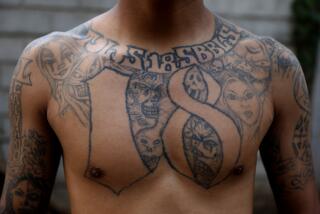Salvador Judge Bars Arrest of Officer in 1981 Slayings
- Share via
SAN SALVADOR — A Salvadoran judge, saying recent testimony was vague and contradictory, refused Wednesday to order the arrest of a Salvadoran officer linked to the 1981 slayings of a land reform official and two U.S. labor advisers.
The Salvadoran attorney general’s office said it will appeal the judge’s action and try to have the officer, Capt. Eduardo Avila, jailed and tried.
No officer of the Salvadoran armed services has ever been charged in court for any of the many non-combat killings attributed to the military in more than five years of civil war.
Through the U.S. Embassy’s efforts, three witnesses stepped forward last week and testified that Avila had admitted planning the three 1981 killings and supplying weapons to the killers.
Two of the witnesses are American citizens: Army Col. Gerald Walker, a former attache at the embassy here, and his wife, Patsy. The third is a Costa Rican, Carlos Aguilar.
In refusing to order Avila’s arrest, Judge Rolando Calderon of the 5th Penal Court in San Salvador dismissed their testimony as “vague, imprecise and fundamentally contradictory. It was neither clear nor decisive.”
Any appeal by the attorney general’s office must be filed within three days. Action on an appeal could take months.
Uncle on Supreme Court
Avila, an officer of the National Guard, which is a security arm of the armed services, is a member of a wealthy Salvadoran family and has an uncle who is a Supreme Court justice.
The victims of the 1981 shooting were Rodolfo Viera, who at the time was head of El Salvador’s land redistribution program, and Mark D. Pearlman and Michael P. Hammer, officials of the American Institute for Free Labor Development, an affiliate of the AFL-CIO.
They were shot with automatic weapons at close range in the coffee shop of the Sheraton Hotel in San Salvador. The confessed triggermen, two Salvadoran corporals, are expected to go on trial this summer.
The case is one of several murders and massacres that the government of President Jose Napoleon Duarte has promised to prosecute. Since Duarte took office in June, 1984, none has gotten anywhere. The Sheraton case was said to stand the best chance of being resolved because of intense U.S. pressure.
Patsy Walker said in a deposition that Avila visited the Walker home in Panama in 1982 and that he told her he “was a man who had participated . . . in things that brought grief to his family and disgraced him with his son.”
She said Avila confessed his role in the shootings and complained of having nightmares about “one of the men shot in the Sheraton who did not die immediately, but, hands clenched and full of blood, laboriously tried to crawl away.”
She charged that Avila threatened her and her family afterward. She said she told her husband of the conversation and that they informed U.S. officials.
The Costa Rican witness, Aguilar, said that in 1982, Avila told him of his role in various “operations” in El Salvador, including the killings at the Sheraton.
‘Little Match’
According to both the Walkers and Aguilar, Avila implicated a man known as “Fosforito, “ which in Spanish means “Little Match.”
“Fosforito” is the nickname of Lt. Rodolfo Lopez Sibrian, a colleague of Avila who had been charged earlier in the shootings. El Salvador’s Supreme Court threw out the charges against Lopez Sibrian last year.
Last summer, the U.S. Embassy had expected Avila to testify against Lopez Sibrian, but Avila refused. This expectation was one reason given by U.S. officials for the long delay in presenting the Walkers’ testimony.
Another reason, a U.S. official said, was the need to get testimony from a witness who was not an American citizen. Aguilar’s cooperation was reportedly obtained some time within the last six months.
Officials of the U.S. Embassy seemed pleased last week when the depositions were given and obviously considered this an important breakthrough. On Wednesday, embassy officials declined to comment.
The two accused gunmen have implicated both Avila and Lopez, but their testimony is useless because the statements of defendants charged in the same crime are not admissible in Salvadoran courts.
Avila is on reserve status and technically cannot leave the country. Nevertheless, U.S. officials have urged Salvadoran military authorities to take steps to prevent him from leaving while the Sheraton case is pending.
More to Read
Sign up for Essential California
The most important California stories and recommendations in your inbox every morning.
You may occasionally receive promotional content from the Los Angeles Times.













